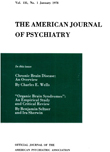Importance of akinesia: plasma chlorpromazine and prolactin levels
Abstract
Akinesia, a common side effect of antipsychotic drugs, often goes unrecognized by physician and patient. Akinetic apathy and lack of spontaneity can be mistaken for the negative symptoms of schizophrenia and add to the well-known social and emotional disability of schizophrenic patients on maintenance therapy. The authors attempted to identify a measure that might distinguish between akinesia and the negative symptoms of schizophrenia but found no relationship between plasma and saliva chlorpromazine levels or prolactin levels and akinesia. The fact that all of the akinetic but only 31% of the nonakinetic patients rated themselves as drowsy 12 hours after their bedtime dose indicates that drowsiness is a fairly accurate correlate of akinesia.
Access content
To read the fulltext, please use one of the options below to sign in or purchase access.- Personal login
- Institutional Login
- Sign in via OpenAthens
- Register for access
-
Please login/register if you wish to pair your device and check access availability.
Not a subscriber?
PsychiatryOnline subscription options offer access to the DSM-5 library, books, journals, CME, and patient resources. This all-in-one virtual library provides psychiatrists and mental health professionals with key resources for diagnosis, treatment, research, and professional development.
Need more help? PsychiatryOnline Customer Service may be reached by emailing [email protected] or by calling 800-368-5777 (in the U.S.) or 703-907-7322 (outside the U.S.).



